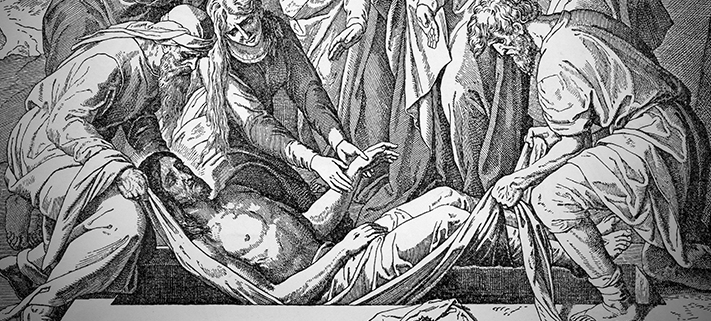Confessions of faith: Lore
An assault survivor shares how her life went from tragedy to triumph and how that has helped her reach out to others.
Alicia A. Neumann
Jay Lore says there was “nothing spectacular” about the way her story started. She was born to a working-class family in New Jersey in the late 1950s. She says they weren’t especially religious, but she and her brother did attend the Baptist church down the street. “I learned the Bible verses. I learned Jesus loves me. I listened to the felt-board stories about all the people God uses to do mighty things.”
She says her mom described her as a “happy-go-lucky kid.” But that all changed when she was four years old and she was sexually assaulted by her older sister’s husband. “He was a monster,” Jay says. “He said if I tell [my family], they wouldn’t love me. So what choice did I have? Who else would I tell? Who would believe me?” She says it wasn’t a topic that anyone talked about in the 1960s.
Spiraling downward
Afraid of the consequences, Jay says she kept silent for years as the abuse continued. She eventually turned to drugs to numb the pain. “I worshipped the euphoric, pain-free feeling,” she says. “That became my mission: to numb all feelings. I was hell-bent on self-destruction.” By the time she was 16, Jay says she had tried suicide twice. “I was filthy, inside and out. Tainted. Broken. I felt like the great God of the felt-board stories was absent and silent; he had better people to take care of anyway,” she says.
She calls the next decade her “drug years.” She says, “It was just a mess. Things got progressively worse. I started dealing drugs to support my habit.” During that time, she also had three children. “I thought I was going to screw up three more lives,” she says. “It was a frightening thing. I thought, How do I protect them if I can’t protect myself?”
Things finally reached a breaking point in 1987. Jay describes that night: “I decided I had had enough. There was nothing left to lose. I had lost my house, my car, my kids, my dog, my hope. And now I was going to lose myself. I remember screaming at God with fists clenched, ‘Where are you? You’re supposed to be so great and good! What have I done to deserve this?’ I laid down to die. A billion thoughts were racing, then everything got so still. I thought, This is it. In the stillness, a voice said, ‘Jay, come.’ I turned my head slightly, and a hand wiped a tear. I could not move.” Hallucination from drugs? A desperate mental hope? Jay is convinced it was Jesus.
Discovering forgiveness
A few days later, Jay went to a nearby clinic—the first step in her long road to recovery. With the help of her counselor, she was able to get sober and finally start processing everything that had happened to her. Eventually, her counselor invited Jay to attend a Lutheran church. “When I got there I thought the roof would fall on my head!” she says. “But then I realized this is what’s been missing. I heard that Jesus loves me and my sins are forgiven, washed away. The more I heard it, I thought, Really, even me? And the answer was yes, even me!” She continued attending and was eventually baptized.
As Jay continued her recovery, she got her kids back—and she insisted they go to counseling. “It wasn’t just me who suffered,” she says. “They needed help too.” She says it took time, but they worked through it together. “My son was in the D.A.R.E. (Drug Abuse Resistance Education) program in school and he wrote an essay on me and my recovery and how proud he was. He won the D.A.R.E. bear for his essay and gave it to me. That meant so much; I still have that bear.”
Jay started helping her counselor give presentations to different community groups on the topic of abuse. She also began reaching out to other survivors. “Those who have experienced it are the best counselors,” Jay says. “I tell them, ‘I’ve done everything, I’ve made mistakes. You’re not alone anymore. You don’t have to dry your tears. I’ll hold your hand, I’ll walk with you through it.’ I want to help them take that first step.”
Finding a home
Fast forward to 2016. Jay was asked if she could help start an adult support group in Colorado. After a lot of consideration and prayer, she loaded all of her possessions into her car and headed west. She was staying with one of her friends in Commerce City as they worked to get the new group started, but then her friend unexpectedly died. “I looked to heaven and said, ‘Now what?’ I had no family, no friends, no place to stay and I was a stranger in a strange land.” Soon after, her car blew up. Jay was stranded.
“I have an issue with depression, and I could feel it hovering,” she says. “I knew despair wasn’t far off. I was sinking into the muck. Old, ugly thoughts started rising. I thought of taking my own life. I was in deep trouble.”
Living Hope was across the street, and she felt that being in God’s house would help. She said the people were friendly and it was a good experience—until communion. “About 20 people went up and I was left sitting alone, excluded from the Lord’s Supper,” she says. “I was offended. A vicar was preaching that day, and I asked him about it, but the poor guy couldn’t answer my rapid-fire questions. I left, vowing never to return.”
But then the new pastor reached out to Jay. They talked about the church and the practice of close communion. “He asked me to visit again, and I said I’d think about it, but I didn’t,” she says. “I wasn’t going back there, period.”
But she did return. “If that wasn’t the Holy Spirit moving me, I don’t know what is,” she says. “When I got there, I made eye contact with the pastor and I knew I was home.”
Jay says her fellow members at Living Hope have shown her the goodness of God. They provided her with transportation and helped her find a place to live. “It was an answer to my prayers,” she says. “I have found a home here among these folks, and I can’t do enough for God—not because I need to, but rather because of all he’s done for me.”
Now, Jay greets everyone at the door each Sunday. She calls herself an “ambassador for Jesus” and hopes that sharing her story with others will show them what God can do.
“My life went from tragedy to triumph; I went from a mess to a messenger,” she says. “I live in the joy of the trial. I sometimes wonder what potential was stolen, but it’s all good. I’m glad God thought I was strong enough. And I truly believe we all go through what we go through in hopes that we turn to God and he can give us the triumph.”
Alicia Neumann is a member at Christ, Zumbrota, Minnesota.
SUBMIT YOUR STORY
Do you have a manuscript, idea, or story from your own life you’d like to share for use in Forward in Christ or on wels.net? Use our online form to share it to our editorial office for consideration.
SUBSCRIBE TO FORWARD IN CHRIST
Get inspirational stories, spiritual help, and synod news from Forward in Christ every month. Print and digital subscriptions are available from Northwestern Publishing House.
Author: Alicia A. Neumann
Volume 106, Number 5
Issue: May 2019
Copyrighted by WELS Forward in Christ © 2021
Forward in Christ grants permission for any original article (not a reprint) to be printed for use in a WELS church, school, or organization, provided that it is distributed free and indicate Forward in Christ as the source. Images may not be reproduced except in the context of its article. Contact us






